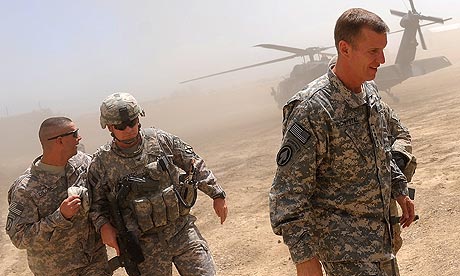
The top US commander in Afghanistan, General Stanley McChrystal, yesterday called for a complete revamp of military strategy in the country, in a sweeping review of operations that acknowledges the disastrous approach of the last eight years and may pave the way for a demand for more troops.
The revised strategy, in the face of the Taliban's expanding influence and waning support for the Kabul government, changes the emphasis from engaging directly with militants to winning the hearts and minds of the Afghan population, officials in Washington and Nato headquarters said. McChrystal portrayed the recent strategy of western forces as the equivalent of a lumbering bull attacking a matador's cape, gradually tiring and finally being killed off. The general, appointed earlier this year, is to go to Washington later this month to advise Barack Obama on whether he needs more troops in adaddition to the 108,000 international troops already there.
The recommendations came as two further British soldiers were killed yesterday, compounding what is the deadliest year for foreign troops since the 2001 invasion. The deaths of the soldiers from The Black Watch, 3rd Battalion The Royal Regiment of Scotland, took the total number of deaths of UK service personnel since operations began in 2001 to 210. The soldiers were killed in a blast while on patrol north of Lashkar Gah, in Helmand province, the Ministry of Defence said. Two American soldiers were also killed in an explosion, the US military said.
Britain is not expected to announce a major increase in the number of its troops in Afghanistan, whatever the US does. Senior British military sources say Britain has effectively increased its contribution by maintaining the extra number of troops sent to Afghanistan this year to help with the elections.
After sending his report to the Pentagon and Nato headquarters, McChrystal said yesterday that, despite the lost ground, victory was still possible. "The situation in Afghanistan is serious, but success is achievable and demands a revised implementation strategy, commitment and resolve, and increased unity of effort."
McChrystal has already begun to implement the new strategy, ordering his forces not to fire or drop bombs if there is a risk of civilian casualties. He has also shifted the focus from the eradication of the poppy crop, which alienated farmers, to attacking drug traffickers.
A key part of this approach is advocating that US, British and other international forces not only train Afghan forces but operate alongside them.
The basis of McChrystal's assessment is contained in guidelines he sent to troops last week in which he said: "The conflict will be won by persuading the population, not by destroying the enemy."
He compared the recent approach as equivalent to a bullfight. "A military force, culturally programmed to respond conventionally (and predictably) to insurgent attacks, is akin to the bull that repeatedly charges a matador's cape – only to tire and eventually be defeated by a much weaker opponent. This is predictable, the bull does what comes naturally. While a conventional approach is instinctive, that behaviour is self-defeating."
The US has 63,000 soldiers in Afghanistan, with another 5,000 on the way.
Anthony Cordesman, a Washington-based strategist who has been an adviser to McChrystal, said in the Washington Post yesterday that the US deployment would need about three to eight more brigades, which would mean anything from 7,000 to 40,000 more troops.
Sending more troops would be politically difficult for Obama, given waning support for the war in the US. In his article, Cordesman also hinted at in-fighting between US commanders and civilians based in Kabul and those in Washington.
US officials and advisers involved with Afghanistan see little salvation in the recent presidential election, especially with questions raised about its legitimacy. Vote tallies released yesterday showed Hamid Karzai, the president, with a strong lead over the top challenger, Abdullah Abdullah.
Karzai had 45.8% of votes counted, while Abdullah had 33.2%, with ballots from almost half of the country's polling stations counted. Karzai needs 50% to avoid a runoff.
David Lidington, the shadow Foreign Office minister, said: "I think McChrystal appears to be bringing together the criticisms that a number of different commentators … have been saying over the last year or more. But we have been saying for a long time that there needs to be much better coordination of the international effort in Afghanistan."
0 comments:
Post a Comment